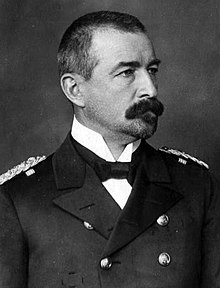Wilhelm Souchon
| Wilhelm Souchon | |
|---|---|

Admiral Souchon
|
|
| Born | June 2, 1864 Leipzig, Kingdom of Saxony |
| Died | January 13, 1946 (aged 81) Bremen, Germany |
| Allegiance |
|
| Service/branch |
|
| Years of service | 1881–1919 |
| Rank | Vice admiral |
| Commands held | Mittelmeerdivision |
| Battles/wars |
|
| Awards | Pour le Mérite |
| Relations | Hermann Souchon |
Wilhelm Anton Souchon (German pronunciation: [suˈʃɔŋ]; 2 June 1864 – 13 January 1946) was a German-born Ottoman admiral in World War I. Souchon commanded the Kaiserliche Marine's Mediterranean squadron in the early days of the war. His initiative played a major part in the entry of the Ottoman Empire into World War I.
Wilhelm Anton Souchon was born on 2 June 1864 in Germany to a family of Huguenot ancestry.
In July 1914, hostilities erupted between the Austro-Hungarian Empire and the Kingdom of Serbia. Rear Admiral Souchon, a native of Leipzig, feared being trapped in the Adriatic Sea in the event of other nations joining in the conflict. Because of this, Souchon took his two ships, the battlecruiser Goeben and the light cruiser Breslau, into the western Mediterranean. When World War I began on 4 August 1914, he bombarded the French-Algerian ports of Bône and Philippeville. He successfully eluded British attempts to corner him (see Pursuit of Goeben and Breslau) and on 10 August 1914, his small squadron arrived at the Dardanelles.
After two days of negotiations, he was allowed to take his ships to Istanbul where they were subsequently transferred officially into the Ottoman Navy. Souchon was appointed Commander-in-chief of the Ottoman Navy and served in this position until September 1917. This gesture by Germany had an enormously positive impact with the Turkish population. At the outbreak of the war, Winston Churchill caused outrage when he "requisitioned" without compensation two almost completed Turkish battleships in British shipyards, Sultan Osman I and Reshadieh, that had been financed by public subscription. These ships were commissioned into the Royal Navy as Agincourt and Erin, respectively. On 15 August 1914, in the aftermath of Souchon's daring dash to Constantinople, Turkey cancelled their maritime agreement with Britain and the Royal Navy mission under Admiral Limpus, and left by 15 September.
...
Wikipedia
